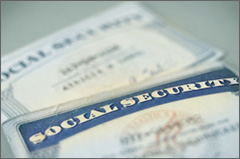EverSafe Scam Watch
Protecting Your Financial Health
Scammers Promise Social Security Statements to Lure Unsuspecting Consumers
Scammers often pretend to represent government agencies as a trick to gain their victims’ trust. In a troubling trend, imposters are now sending emails that appear to come from the Social Security Administration, offering people copies of their Social Security statements if they click on an attached link. But if you  do, scammers may capture personal financial information that is stored on your computer.
do, scammers may capture personal financial information that is stored on your computer.
“DO NOT CLICK THE LINK,” warns the Social Security Administration’s Office of the Inspector General (OIG) in a special alert. “These emails are not from SSA and will compromise your personal data and will likely damage your computer system once you allow access.”
Individuals who click on the link give fraudsters the ability to install a remote control tool on their personal computer, “a dangerous tool in the hands of cybercriminals,” says Malwarebytes, an anti-malware software company that flagged the scam last month. The tool is often used by legitimate businesses to help IT support teams figure out issues remote users might be having with their computer.
But scammers can use it to steal banking data and other sensitive information, including confidential files. Malwarebytes warns that the scam is sophisticated, which means the emails are getting through scam filters.
The Social Security Administration warns that the images in the email look authentic. But the agency is not sending such emails to the public, and recipients of the email should delete it. Be aware that authentic emails from US government agencies end in “.gov.”
If you need your Social Security statement or other information about your benefits, you can create a personal “my Social Security account” by clicking here. And you can learn more about Social Security in general by visiting the agency’s website (ssa.gov).
Victims of email fraud can notify Social Security’s Office of the Inspector General at https://secure.ssa.gov/oig/scam and local law enforcement. It is also recommended that you let your financial institutions know about the incident and that you may have been compromised.
Voting for Your Friend’s Kid on WhatsApp May Cost You
Scammers are clever at exploiting human behavior. They anticipate that when your friend asks you to vote for her child in an online contest, you’ll do it. Or when your own kid says he lost his phone and needs money, you’ll send it in a hurry.
 Both of these scenarios are real scams that have increasingly targeted users on WhatsApp, according to a report from The 420, a site that covers digital crime.
Both of these scenarios are real scams that have increasingly targeted users on WhatsApp, according to a report from The 420, a site that covers digital crime.
In the vote-for-my-kid scam, your friend may ask you to click on a link that provides a six-digit code that the scammer is simultaneously requesting from WhatsApp as part of a login attempt. By entering this verification code, the victim unknowingly grants the attacker access to their account. The fraudster then reaches out to all your contacts, saying you are in a jam and need cash fast. The amount doesn’t usually raise suspicions, so your friends send it.
The digital experts at The 420 recommend that you always contact your friends or family via another channel to verify whether such a request is legitimate. Don’t ever share your WhatsApp verification code, even with people you know. If you are a victim of a WhatsApp scam, report it and notify your banks. As with the Facebook Scam that Scam Watch reported on in February, two-factor authentication (which requires two forms of identification to access an account) can help protect your accounts from hacks such as this.
Separately, The Guardian reports that WhatsApp is also often used by scammers who pose as your kids, sending you a message that says they have lost their phone and to please text them back at an unknown number. Then they claim they can’t access their money because of the lost phone and ask you to transfer them funds, even if the bank account is in another name.
The article suggests you call your relative on their real phone to see if they truly are in trouble, ask a question that only your relative can answer, or be proactive and set up a family passcode ahead of time for situations like this.
FBI Warns of Discount Health Insurance Scams
 Fraudsters are pitching discounted medical insurance policies that fail to deliver on their promises, the FBI warned in a nationwide alert. The scammers pressure people to sign up fast, promising great coverage and special deals, but the reduced-rate policies are bogus, the FBI said. The warning cited a case in the state of Washington, which issued a cease-and-desist order against a company operating under several names. More than 100 consumers across the country paid for insurance but did not receive any coverage, nor could they obtain refunds. Many found the companies through unsolicited calls, emails, and texts. They lost more than $777,000.
Fraudsters are pitching discounted medical insurance policies that fail to deliver on their promises, the FBI warned in a nationwide alert. The scammers pressure people to sign up fast, promising great coverage and special deals, but the reduced-rate policies are bogus, the FBI said. The warning cited a case in the state of Washington, which issued a cease-and-desist order against a company operating under several names. More than 100 consumers across the country paid for insurance but did not receive any coverage, nor could they obtain refunds. Many found the companies through unsolicited calls, emails, and texts. They lost more than $777,000.
The FBI suggests that you verify insurance coverage through your state insurance commissioner or Better Business Bureau before purchasing. Ask your providers if they will accept the insurance. Make sure you read the fine print in any policy – and be skeptical if you never receive documents.
The Maryland Health Insurance Administration offers these tips to protect consumers from health insurance scams:
- Verify that offers, especially those that are unsolicited, are authentic. Look up the company and try to call them – using sources other than what the company provided. Check that they are licensed or registered in your state.
- Don’t pay for anything up front until you know the company you are talking to is legitimate.
- Check the company’s history of complaints. See if the person you are talking to has a license and verify it with your state insurance office.
- “With the rising cost of health care and prescription drugs, products promising to save “50% to 80%” on the cost of health care are becoming more appealing to consumers,” the Maryland site states. But it is important to keep in mind the old saying, “if it sounds too good to be true, it probably is.”



